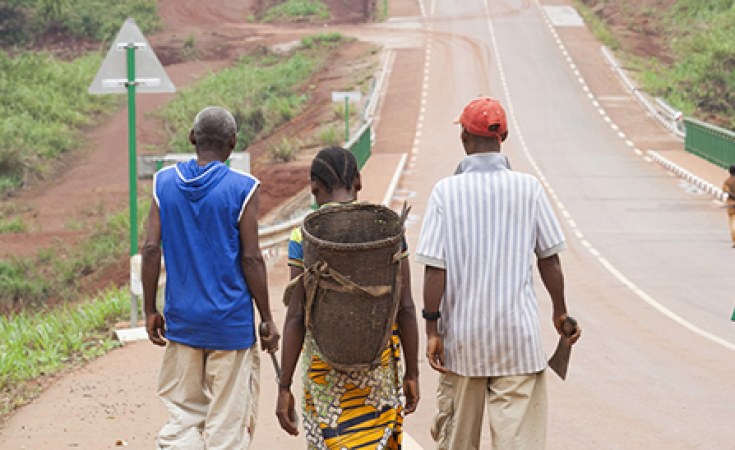The New Partnership for Africa's Development Infrastructure Project Preparation Facility (NEPAD-IPPF) has continued to support African countries to strengthen regional infrastructure connectivity by providing grants for project preparation and development for complex, cross-border regional infrastructure projects in energy, transport, ICT and trans-boundary water.
This directly supports Africa's integration and industrialization efforts as well as trade in goods and services and helps to improve the quality of lives of Africans by improving access to infrastructure services - electricity, transport, communications and water.
NEPAD-IPPF provides grants to African countries through Regional Economic Communities (RECs) and specialized regional infrastructure institutions such as Power Pools to undertake feasibility, technical and engineering designs, environmental and social impact assessment studies, as well as preparation of tender documents and transaction advisory services to make projects bankable for financing and implementation in support of Africa's socio-economic transformation.
Taking stock of achievements during 2016 at the Business Strategy Workshop for NEPAD-IPPF held at the headquarters of the African Development Bank (AfDB) in Abidjan, Côte d'Ivoire, on Friday, ebruary 3, 2017, Shem Simuyemba, NEPAD-IPPF Fund Manager, informed the gathering that during 2016, NEPAD-IPPF had approved a total of US $14.83 million for the preparation of eight regional projects covering energy, transport and water.
Five energy/power projects were approved, two in West Africa, two in Southern Africa and one in East Africa. In West Africa, these were, the Nigeria-Benin 330 kV Power Interconnector Reinforcement Project executed by the West African Power Pool (WAPP) and the Feasibility Study for Women in a Changing Energy Value Chain in West Africa under the ECOWAS Centre for Renewable Energy and Energy Efficiency (ECREE) intended to unlock business opportunities for women entrepreneurs in the energy value chain. In East Africa, NEPAD-IPPF funded the Uganda-Tanzania Refined Oil Products Pipeline Project with oversight from the East African Community Secretariat. In Southern Africa, approved projects were, the Zambia-Mozambique 400 kV Power Interconnector Project and the Kolwezi (DRC)-Solwezi (Zambia) 330 kV Power Interconnector Project linking the two copper-mining belts of Katanga in the Democratic Republic of Congo (DRC) and Northwestern Zambia. The Executing Agency for the two projects is the Southern Africa Power Pool (SAPP). The Zambia-Mozambique Power Interconnector Project is co-financed with the US Trade and Development Agency (USTDA).
Project preparation and development work undertaken by NEPAD-IPPF has had a major impact in generating bankable projects, which have attracted financing for implementation. An example is the Power Interconnector, 330 kV North Core Project involving Nigeria, Niger, Benin and Burkina Faso. NEPAD-IPPF provided US $5.9 million for the preparation of this project (one of the largest grants for a single project). The estimated financing cost of the project was US $681.67 million. However, at the North Core Financing Roundtable held on November 9, 2016, under the auspices of WAPP and the countries concerned, the project attracted US $1.205 billion in financing pledges.
The two transport projects approved were the Route Multinationale, Kribi-Campo-Bata, the road/bridge over the Ntem River linking Cameroon to Equatorial Guinea, for a grant of US $3.04-million under the Economic Community of Central African States, an important transport and trade corridor in Central Africa. The other was in East Africa, the Lamu Port Development: Transaction Advisory Services and Technical Assistance - Phase 1 for a public-private partnership (PPP) to develop the new Port of Lamu in Kenya to serve the countries of Ethiopia, South Sudan and Kenya under the US $20-billion LAPSEET mega infrastructure project.
One trans-boundary water project, the Multinational, Orange-Sengu River Basin Project, was also approved in 2016. The purpose of the grant is to assist in the preparation of a Climate Resilient Water Resources Investment Strategy and Plan and Multipurpose Project for the Orange Senqu River Basin. The project is co-funded by the Africa Water Facility and the Global Water Partnership (GWP) and is managed by the Orange River Basin Commission. It will benefit the four countries of Lesotho, South Africa, Botswana and Namibia as it serves, among others, Africa's most dense economic space, the Gauteng Province of South Africa with its mining, agricultural and industrial activities.
NEPAD-IPPF is a multi-donor Special Fund hosted by the African Development Bank (AfDB), established under the G8 as part of the support to the NEPAD African Action Plan and is managed in close partnerships with the African Union Commission (AUC) and the NEPAD Agency. Donors supporting NEPAD-IPPF include Canada, Denmark, Germany, Norway, Spain and the UK. Since its establishment in 2005, NEPAD-IPPF has approved 72 grants for complex, cross-border regional infrastructure projects resulting in downstream financing of US $7.88 billion, demonstrating the high leverage effect of well-prepared projects.
Under its current Strategic Business Plan (SBP) for the five-year period, 2016-2020, NEPAD-IPPF requires funding of about US $250 million to prepare 80 to 100 regional infrastructure projects expected to generate US $25 billion in infrastructure investments. NEPAD-IPPF is also increasingly linking its project preparation work to financial closure and part of the thrust of its new business orientation is to engage early with project developers, financiers and investment houses to ensure that NEPAD-IPPF prepared projects respond better to investor needs.
"NEPAD-IPPF is a tested brand across Africa in supporting African countries to prepare complex, cross-border regional infrastructure projects and to bring them to bankability and therefore offers a total-project-development-solution," said Simuyemba. He also observed that NEPAD-IPPF unlocks business opportunities across the "infrastructure value chain", not just in advisory services, but also financing, construction, equipment supply, technology and skills as well as operations and maintenance.



